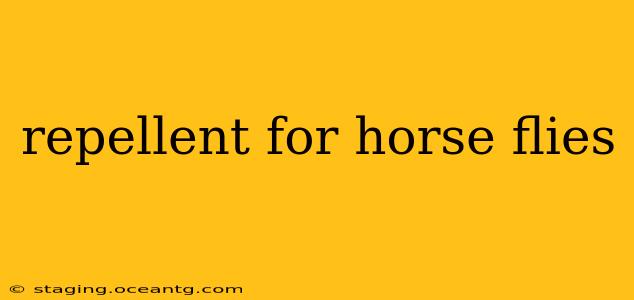Horse flies are more than just a nuisance; their aggressive biting can cause significant pain, discomfort, and even transmit diseases. Finding effective horse fly repellent is crucial for both human and equine well-being, whether you're enjoying a summer hike, working with horses, or simply spending time outdoors. This comprehensive guide explores various repellent options, addressing common questions and concerns surrounding these persistent pests.
What are the Best Repellents for Horse Flies?
The market offers a wide range of horse fly repellents, each with its strengths and weaknesses. Effective repellents often contain active ingredients like DEET, picaridin, IR3535, or essential oils. The best choice depends on factors such as personal sensitivity, application area (human or animal), and environmental conditions.
-
DEET-based repellents: DEET is a highly effective insecticide, offering long-lasting protection. However, it's important to choose products with a lower concentration (around 20-30%) for sensitive skin and to avoid contact with eyes and mucous membranes.
-
Picaridin-based repellents: Picaridin provides a comparable level of protection to DEET, but with a gentler scent and generally milder effects on the skin. It's often preferred for children and individuals with sensitive skin.
-
IR3535-based repellents: IR3535 is another effective active ingredient known for its gentle nature and low toxicity. It's a good option for those seeking a milder alternative to DEET.
-
Essential oil-based repellents: Many essential oils, such as citronella, eucalyptus, and lemongrass, possess natural insect-repelling properties. However, their effectiveness can be variable, and their protection duration is typically shorter than synthetic repellents. Always ensure any essential oil-based repellent is specifically formulated for use on humans or animals.
What Repellent is Safe for Horses?
Choosing a horse fly repellent for your equine companion requires extra caution. Never use human repellents on horses without explicit veterinary guidance. Many human repellents contain ingredients toxic to horses. Look for products specifically labeled as "horse fly repellent" and follow the instructions carefully. These often rely on natural ingredients or specialized formulations designed for equine use. Always consult your veterinarian before using any new product on your horse.
Are There Natural Repellents for Horse Flies?
Yes, several natural repellents can deter horse flies. These include:
- Fans: Horse flies are strong fliers but aren't great at navigating strong wind. A simple fan can create enough air disturbance to keep them at bay.
- Essential oil diffusers: Diffusing certain essential oils (like citronella or eucalyptus) around your outdoor space might deter horse flies. However, remember that the effectiveness varies.
- Physical barriers: Protective clothing, including long sleeves and pants, along with hats and netting, can minimize bites.
How Long Do Horse Fly Repellents Last?
The duration of effectiveness varies greatly depending on the type of repellent, the active ingredient concentration, weather conditions (humidity, wind, rain), and the amount applied. Always read the product label for specific guidelines on reapplication frequency.
How Often Should I Reapply Horse Fly Repellent?
This depends heavily on the repellent itself and environmental factors. Check the product label for precise guidance. Generally, reapplication is necessary after swimming, sweating heavily, or several hours of exposure. Always err on the side of caution and reapply more frequently in hot, humid, or windy conditions.
What are Some Homemade Horse Fly Repellents?
While some homemade options circulate, it's crucial to proceed with caution. The effectiveness of homemade repellents is often unreliable, and some ingredients can be harmful to humans or animals. Always prioritize commercially available repellents, especially when using on horses. A veterinarian should be consulted before using any homemade concoction on your horse.
This comprehensive guide provides a solid foundation for selecting the most effective and safe horse fly repellent for your needs. Remember to always read product labels carefully and consult a veterinarian or healthcare professional if you have any concerns. With the right precautions, you can enjoy the outdoors without succumbing to the relentless bites of these pesky insects.
